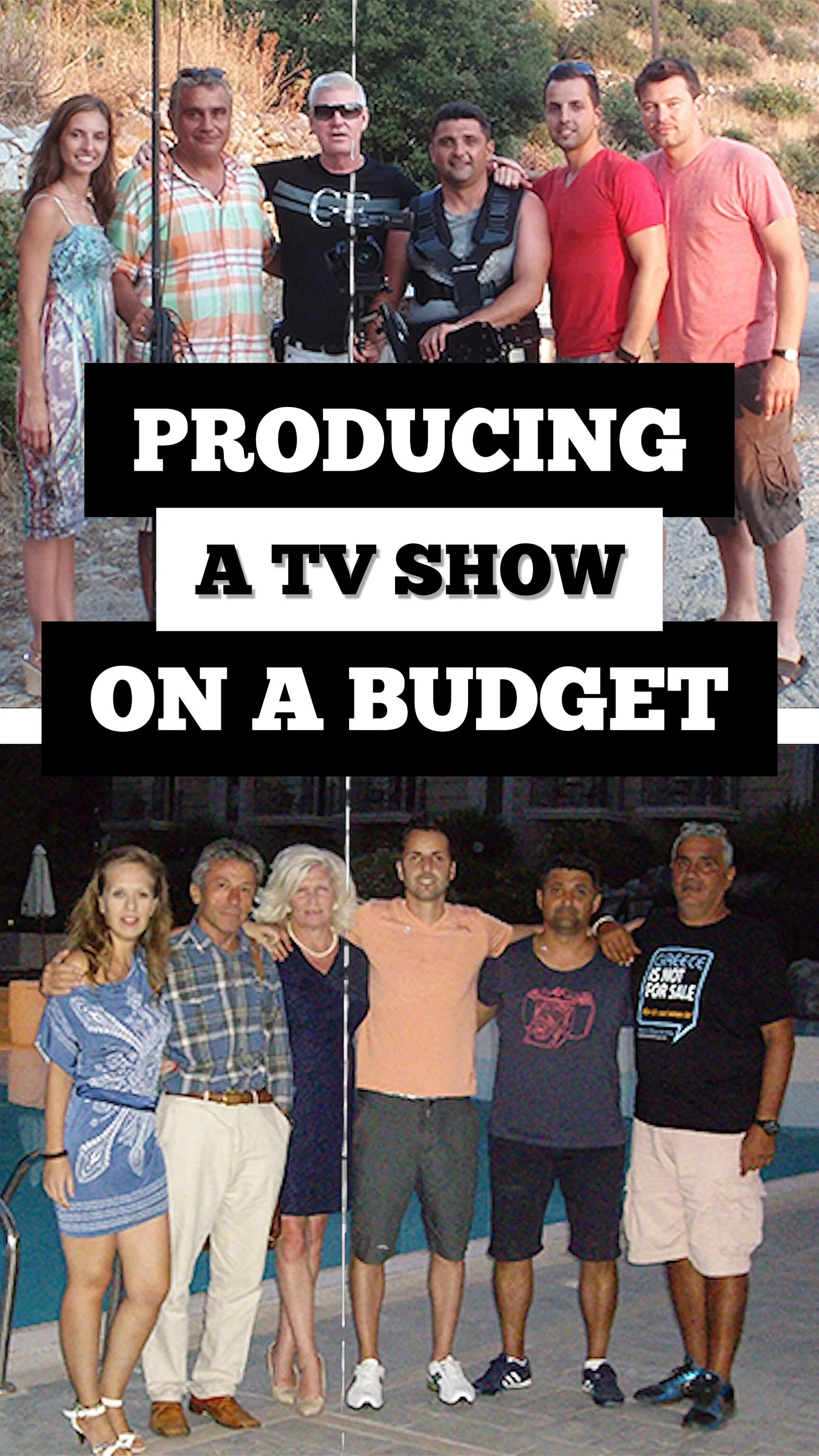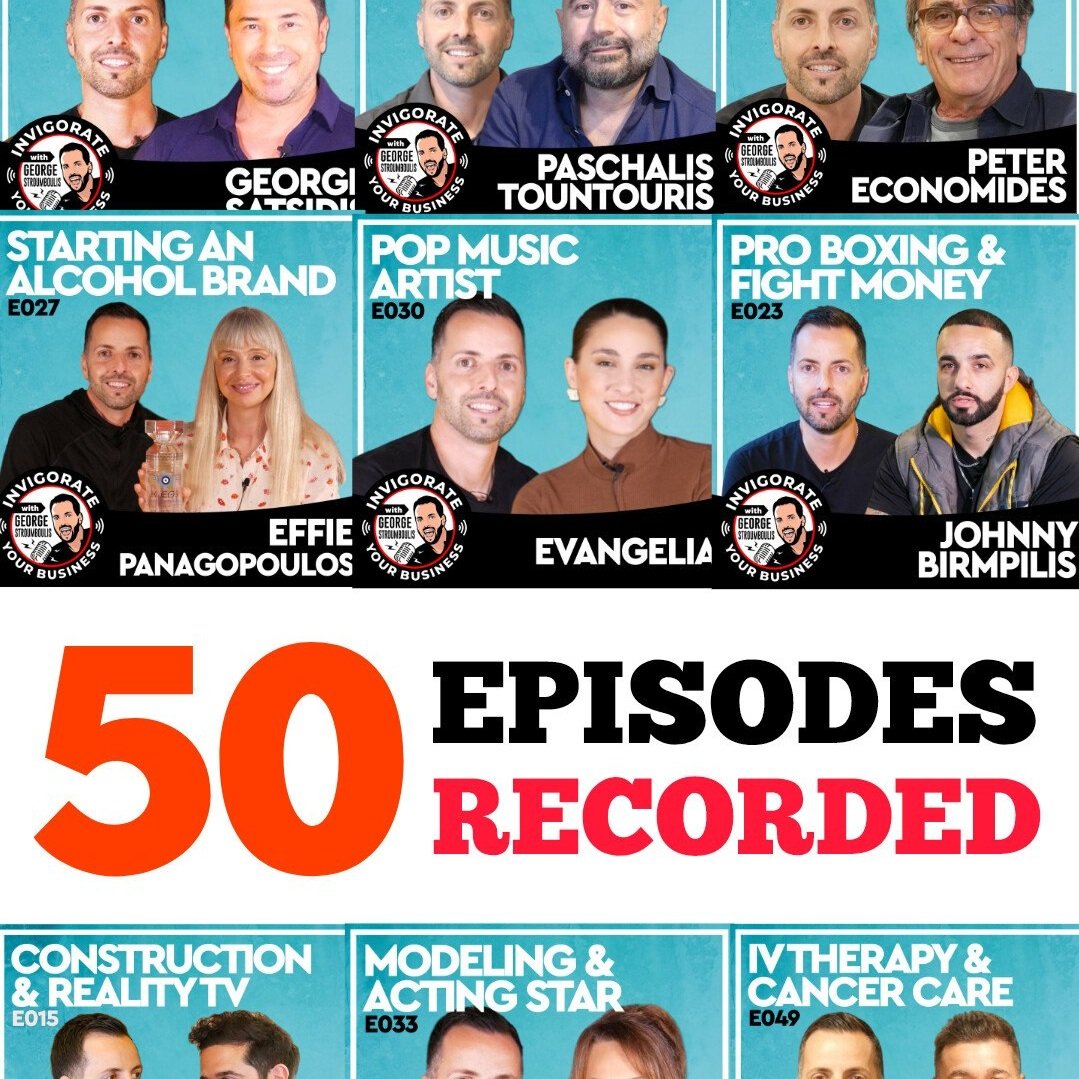PRODUCING A GREEK REALITY TV SHOW ON A BUDGET DURING MY VACATION TIME
“During those 10 days, I produced and went to all seven locations across Greece. And in 10 days with lifelong friends now, we traveled to Mytilini, Crete, Athens, Stoupa, all these locations, and we were filming all these international couples and families coming to Greece to buy properties. ”
Producing a RealityTV SHOW ON A BUDGET
Over a decade ago, I launched a TV show called "Hellenic Home Hunting." It was something that I self-funded. I was working for a company at the time, and I took a vacation. During those 10 days, I produced and went to all seven locations across Greece. And in 10 days with lifelong friends now, we traveled to Mytilini, Crete, Athens, Stoupa, all these locations, and we were filming all these international couples and families coming to Greece to buy properties.
Basically, like House Hunters International. I did that. I did not have a network at the time where we would air this. And that is when someone from the Canadian Embassy, who is now a lifelong friend, helped me walk it into Antenna. They picked it up, I had zero mindset of making this profitable. It got on air.
The connections made and the friendships established during this filming experience has lasted a lifetime.
How do you produce a TV Show?
Producing a TV show involves a multi-step process that requires careful planning, organization, and collaboration among various creative and technical teams. Here's a general overview of the steps involved in producing a TV show:
Concept Development:
Develop a unique and compelling TV show concept that aligns with the target audience's interests and preferences. This concept will serve as the foundation for the entire production.
Scriptwriting and Storyboarding:
If the show involves scripted content, write the scripts for each episode. For unscripted shows, outline the format and structure of each episode. Storyboarding can help visualize scenes and shots.
Pre-Production:
Plan all the logistical and creative aspects of the show. This includes budgeting, scheduling, location scouting, casting, hiring crew members, designing sets, costumes, and props.
Casting:
Cast the actors or participants for the show. Hold auditions or interviews to select individuals who fit the characters or roles.
Budgeting and Financing:
Create a budget that outlines the costs associated with every aspect of production, from pre-production to post-production. Secure funding through investors, production companies, networks, or other sources.
Location Scouting and Set Design:
Identify suitable filming locations based on the show's requirements. Design and build sets, if necessary, to create the desired environments.
Production:
Begin filming or recording the show based on the script and pre-production plans. The production phase involves capturing all the necessary scenes, dialogues, and actions.
Directing and Camera Work:
The director oversees the creative aspects of production, guiding actors, camera operators, and crew members to achieve the desired shots and performances.
Cinematography and Lighting:
Cinematographers and lighting teams work together to achieve the desired visual aesthetics, camera angles, and lighting setups for each scene.
Sound Recording:
Sound technicians ensure clear and high-quality audio by recording dialogues, ambient sounds, and other audio elements during filming.
Post-Production:
Edit the recorded footage, add visual effects, graphics, music, and sound effects to create the final product.
Editing:
Editors assemble the footage, ensuring continuity, pacing, and storytelling coherence. They add transitions, music, and other elements to enhance the viewing experience.
Sound Design and Mixing:
Sound designers enhance the audio quality by adding sound effects, mixing audio tracks, and ensuring a balanced sound mix.
Visual Effects (if applicable):
If the show requires visual effects, VFX artists create and integrate digital elements seamlessly into the footage.
Music and Score:
Composers create original music or select licensed tracks that fit the show's tone. Music enhances emotional impact and overall engagement.
Quality Control:
Review the final edited product to ensure it meets the desired standards of quality, accuracy, and storytelling.
Distribution and Broadcasting:
Distribute the completed TV show to networks, streaming platforms, or other distribution channels for broadcasting or online streaming.
Promotion and Marketing:
Collaborate with the marketing team to create promotional materials, trailers, and advertisements to generate interest and viewership.
Release and Viewer Interaction:
Release episodes according to the schedule and engage with viewers through social media, events, and other platforms.
Evaluation and Feedback:
Collect feedback from viewers, analyze ratings, and assess the success of the show. Use this information to improve future productions.
The process of producing a TV show can vary depending on the show's format, genre, budget, and distribution platform. Effective communication, collaboration, and attention to detail are essential throughout each step of the production process.
how to get a Reality TV show on a network channel in greece
Getting a reality TV show on a network channel in Greece, or any country, involves a multi-step process that requires careful planning, preparation, and pitching. Here's a general outline of the steps you can take:
Concept Development:
Develop a unique and compelling reality TV show concept that aligns with the preferences and interests of the Greek audience. Research existing shows to identify gaps and opportunities.
Market Research:
Conduct thorough market research to understand the current trends in reality TV in Greece. Identify the target demographic, viewer preferences, and potential competitors.
Create a Pitch Package:
Create a detailed pitch package that includes a show synopsis, format description, episode ideas, sample script, and visuals (e.g., concept art, mock-ups, sizzle reel). Your pitch should clearly communicate the show's concept, appeal, and potential.
Networking:
Establish connections in the Greek television industry. Attend industry events, workshops, and conferences to meet professionals, producers, and executives who can guide you through the process.
Identify Potential Channels:
Research and identify network channels in Greece that might be a good fit for your reality TV show. Consider factors like target audience, programming lineup, and channel ethos.
Prepare a Pitch Presentation:
Create a polished pitch presentation that succinctly presents your show concept, the unique selling points, potential audience, and how it aligns with the channel's programming.
Pitch Meetings:
Request meetings with the programming executives of the chosen network channels. Present your pitch presentation and be prepared to answer questions and address concerns.
Negotiations:
If a network shows interest, negotiations may begin. This includes discussions about show development, production budget, format rights, and other contractual terms.
Pilot Episode or Sizzle Reel:
Develop a high-quality pilot episode or sizzle reel that showcases the essence of your reality TV show. This visual representation can provide potential networks with a tangible idea of the show's appeal.
Funding and Sponsorships:
Secure funding for the production of the show. This can involve seeking investments, sponsorships, or partnerships with brands that align with your show's concept.
Production Planning:
Collaborate with a production team to plan the logistics of filming, casting, locations, equipment, and other production aspects.
Filming and Post-Production:
Execute the production plan and film the episodes. After filming, proceed with post-production, including editing, sound design, and graphics.
Submit Final Product:
Submit the final episodes to the network channel for review. They may provide feedback and request adjustments before finalizing the content.
Promotion and Marketing:
Collaborate with the network's marketing team to promote the show through various channels, including social media, traditional media, and events.
Broadcasting:
Once all preparations are in place, the show will be scheduled for broadcasting on the network channel.
Remember that the process can be competitive, and not all pitches will be accepted. Persistence, professionalism, and a well-developed concept are key. Each network might have specific submission guidelines, so make sure to research and follow those guidelines closely. Networking within the industry can also significantly increase your chances of getting your reality TV show on a network channel in Greece.





















